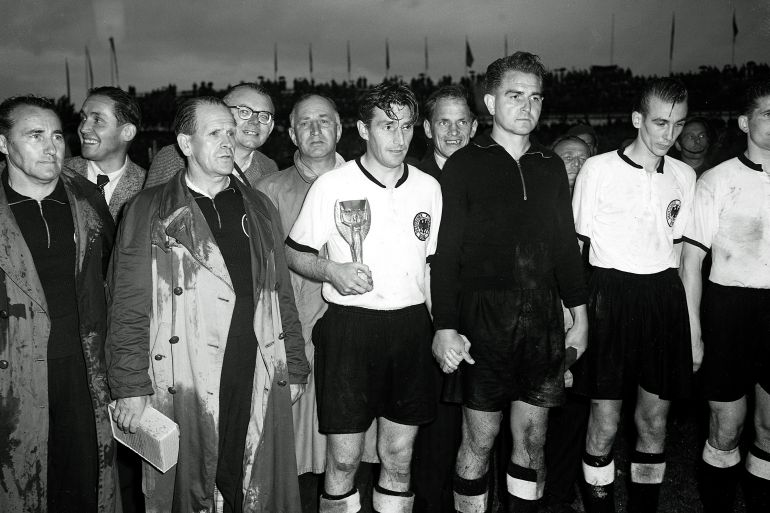World Cup 1954: West Germany, Hungary and the Miracle of Berne
Being one of the few European nations not to be deeply affected by World War II, Switzerland was chosen to host the 1954 World Cup.

Host: Switzerland
Teams: 16
Format: Group stage, knockouts
Matches: 26
Goals: 140
Winners: West Germany
Runners-up: Hungary
Golden boot: Sandor Kocsis (Hungary)
Background
Being one of the few European nations not to be deeply affected by World War II, Switzerland was chosen to host the 1954 World Cup as the tournament returned to Europe after 16 years.
Keep reading
list of 3 itemsWhy is a Japanese cartoon a hero for Spanish footballers?
Why are Brazilian football fans ditching the yellow jersey?
The World Cup was spread across six cities in the Alp nation. Apart from the hosts and defending champions Uruguay, 14 teams qualified from across Europe, the Americas and Asia.
The change in location from the last World Cup in Brazil led to a change in atmosphere from the frivolous and exuberant home crowds to a much smaller audience in stadiums nestled between the Alps.
The on-field action, however, made up for it. The tournament saw several high-scoring games which broke many records.
History of the world cups:
How the football World Cup finally came about in 1930
The controversies, shocks at the 1934 FIFA World Cup
FIFA World Cup 1938: Italy defend title before WWII breaks out
World Cup 1950: When football’s biggest event resumed after WWII
Austria’s 7-5 defeat of Switzerland after 90 minutes still holds the record for the most goals scored in a World Cup match.
South Korea, meanwhile, were on the receiving end: 16 goals conceded and none scored.
The high-scoring clashes culminated in a final that would be remembered for years as one of the biggest upsets.
Hungary were firm favourites on the back of their Olympic gold in 1952 and an unbeaten run of 32 wins.
Their star-studded lineup was led by football’s first global superstar Ferenc Puskas.
Puskas, however, got injured in the group match against the same opponents and played the final despite not having fully recovered. He was still able to put his side into the lead with a goal in the sixth minute. The favourites seemed on course to a predictable win when Zoltan Czibor scored a second two minutes later.
But the West Germans made their way back into the match with a 10th-minute goal from Max Morlock and one from Helmut Rahn in the 18th minute.
The comeback was completed with a goal from Rahn six minutes from time. West Germany wrote itself into history with what is known as the Miracle of Berne.
Highs
It was a high-scoring tournament with 140 goals at an average of 5.38 goals per match, the highest ever.
It became the first World Cup to be televised, although not all the games were shown and not for their full duration.
Puskas, widely considered one of the first global superstars of the game, played his first World Cup.
Lows
South Korea made their debut and exit at a World Cup in the most ignominious fashion when they conceded 16 goals and failed to score before crashing out.
South American powerhouse Argentina declined to participate for the third consecutive time.